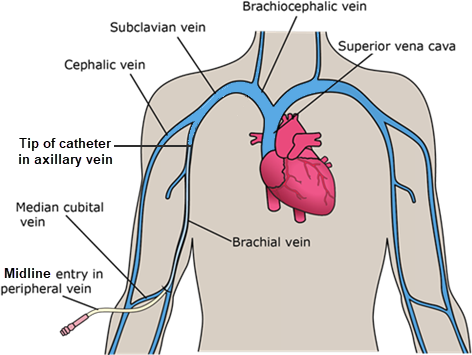Midline catheters (MLCs) are similar to peripherally inserted central catheters (PICC lines) but they are shorter and the tip doesn’t reach the central venous system. Previous CPT coding advice was to code MLCs as PICC lines with a modifier for reduced services, but as of 2019, new instructional notes direct that MLCs are reported with the following CPT codes:
| 36400 | Venipuncture, younger than age 3 years, necessitating the skill of a physician or other qualified health care professional, not to be used for routine venipuncture; femoral or jugular vein |
| 36406 | other vein |
| 36410 | Venipuncture, age 3 years or older, necessitating the skill of a physician or other qualified health care professional (separate procedure), for diagnostic or therapeutic purposes (not to be used for routine venipuncture) |

©2019 Haugen Consulting Group, Inc.
The code descriptions state these codes can only be reported when performed by a physician or qualified health care professional (QHP) and there has been confusion on whether hospitals can report these codes when MLCs are placed by vascular nursing team. Haugen Consulting Group presented this question to Coding Clinic for HCPCS. They confirmed that since vascular nurses are specially trained and licensed, they meet the criteria for QHPs. That means that when MLCs are placed by vascular nurses in the hospital setting, the above codes can be reported. But beware: the separate procedure designation on code 36410 means it’s bundled with many other CPT codes, such as infusion therapy. Be sure to check NCCI edits before submitting code 36410 with other services.
Check out our recent education regarding this topic!

Kristi Pollard, RHIT, CCS, CPC, CIRCC, AHIMA-Approved ICD-10-CM/PCS Trainer
Senior Consultant
Kristi is a senior consultant with more than 20 years of industry experience; she is responsible for the development of web-based, instructor-led, and webinar training materials; conducting training in ICD-10-CM/PCS and CPT; and performing DRG and APC audits. Kristi has an extensive background in coding education and consulting and is a national speaker on topics related to ICD-10 and CPT coding as well as code-based reimbursement. She has designed and developed training programs for inpatient and outpatient hospital-based coding, including vascular interventional radiology, interventional cardiology, orthopedics, and obstetrics.
Kristi has served the Colorado Health Information Management Association (CHIMA) as board Director, co-chair of the Data Quality Committee, and co-chair for the ICD-10 Task Force. She is also a past president of the Northern Colorado Health Information Management Association (NCHIMA). Kristi devotes extra time to mentoring current and future coders through her Coder Coach blog and is the proud recipient of the 2011 AHIMA Triumph Award for Mentoring. She has also received awards from CHIMA for Distinguished Member (2018) and Outstanding Volunteer (2013) and from AHIMA for Roundtable Achievement in Coding Excellence (RACE).

Hello there, thank you for this! Is the language regarding the aha coding clinic question and answer being released in one of the clinics perhaps?
Hi Jayson –
We submitted the question regarding midline catheters being placed by nurses to Coding Clinic for HCPCS in 2019 and received a response in October of that year. To date, Coding Clinic for HCPCS has not published that question or answer. If you would like to submit the question to Coding Clinic in an attempt to get the topic published, you can create an account and submit questions at https://www.codingclinicadvisor.com/